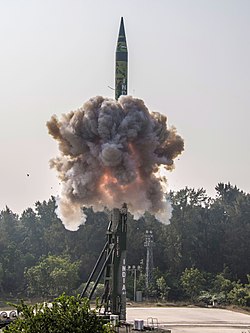| Agni-V | |
|---|---|
 Agni-V on a Test Flight | |
| Type | ICBM[1][2] |
| Place of origin | India |
| Service history | |
| In service | Active[3][4] |
| Used by | Strategic Forces Command |
| Production history | |
| Designer | Defence Research and Development Organisation |
| Manufacturer | Bharat Dynamics Limited |
| Unit cost | ₹50 crore (US$6 million)[5] |
| Specifications | |
| Mass | 50000–56000 kg[6] |
| Length | 17.5 m[7] |
| Diameter | 2 metres (6 ft 7 in) |
| Warhead | 3-6 (Tested)[8][9] 10-12 Warheads [10] Nuclear MIRVs |
| Warhead weight | 3,000–4,000 kilograms (6,600–8,800 lb)[11] |
| Engine | Three-stage solid rocket |
| Propellant | Solid fuel |
Operational range | 7,000–8,000 kilometres (4,300–5,000 mi) [12][13][14][15] |
| Maximum speed | Terminal phase: Mach 24 (29,400 km/h; 18,300 mph; 8.17 km/s)[16] |
Guidance system | Ring Laser Gyroscope Inertial Navigation System Optionally augmented by GPS/NavIC |
| Accuracy | <10 m CEP[17][18] |
Launch platform | 8 × 8 Tatra TEL Rail Mobile Launcher (Canisterised Missile Package) [19] |
| Transport | Road |
Agni-V (Sanskrit: अग्नि; lit. Fire) is a land based nuclear MIRV-capable Intercontinental Ballistic Missile (ICBM) developed by the Defence Research and Development Organisation (DRDO) of India. The missile has a range of more than 7,000 km.[12][13] It is a three-stage, road-mobile, canisterised and solid-fuelled ballistic missile.[20] It is one of the fastest missiles in the world, reaching speeds up to 29,400 km/hr.[21]
- ^ Rajat Pandit (17 November 2011). "Eyeing China, India to enter ICBM club in 3 months". The Times of India. Retrieved 26 October 2021.
- ^ Rahul Datta (8 October 2011). "With Russian help, India to enter ICBM club soon". Dailypioneer. Retrieved 20 April 2012.
- ^ Cite error: The named reference
ndtvwas invoked but never defined (see the help page). - ^ Pubby, Manu (19 November 2019). "Confident of doubling range of the Astra, will be the most lethal air to air missile: DRDO Chief". The Economic Times. Retrieved 19 November 2019.
- ^ "India has all the building blocks for an anti-satellite capability". India today. Retrieved 12 August 2012.
- ^ T.S. Subramanian (23 July 2011). "Preparations apace for Agni V launch". The Hindu. Retrieved 19 April 2012.
- ^ "DRDO plans to test 10 missiles this year". The Times of India. 27 January 2011. Archived from the original on 1 May 2013. Retrieved 19 October 2011.
- ^ "India's MIRV-tipped Agni-5 Missile Test : All your questions answered". Business Standard.
- ^ "One missile, many weapons: What makes the latest Agni-5 special". The Indian Express. 12 March 2024. Retrieved 14 March 2024.
- ^ Cite error: The named reference
:2was invoked but never defined (see the help page). - ^ Rajat Pandit (20 April 2012). "Canister storage gives N-capable Agni-V missile flexibility". The Times of India. Retrieved 20 April 2012.
- ^ a b "Agni-V can now strike targets beyond 7,000 km if India wants; 20% weight reduced: Report". Hindustan Times. 17 December 2022. Retrieved 18 December 2022.
- ^ a b "If India wants, Agni missiles can now strike targets beyond 7,000 kms". ANI News. Retrieved 18 December 2022.
- ^ "Agni-5". Missile Threat. Center for Strategic and International Studies. Retrieved 30 October 2020.
- ^ Cite error: The named reference
chineseCLwas invoked but never defined (see the help page). - ^ "India joins the elite list of nations with test of Agni-V MIRV tech". Economic Times (India Times). Retrieved 13 May 2024.
- ^ "Agni-V vital: Tessy Thomas". The Hindu. 2 October 2013. Retrieved 23 October 2013.
- ^ Cite error: The named reference
capsindia.orgwas invoked but never defined (see the help page). - ^ Y. Mallikarjun, Agni-V design completed; to be test-fired in 2010, The Hindu, 27 November 2008
- ^ Gupta, Shishir (16 December 2022). "Has the range of Agni V missile been increased?". Hindustan Times. Retrieved 20 December 2022.
- ^ "India joins the elite list of nations with test of Agni-V MIRV tech: What's MIRV tech? How is it unique?". The Economic Times. 11 March 2024. ISSN 0013-0389. Retrieved 18 September 2024.